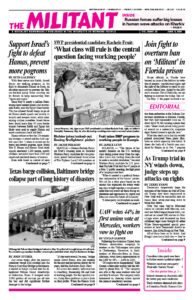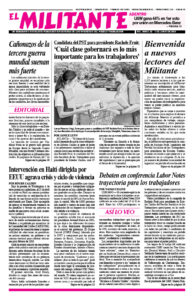Following the victorious United Auto Workers unionization campaign by workers at the Volkswagen auto plant in Chattanooga, Tennessee, in April, workers at Mercedes-Benz in Vance, Alabama, voted down representation by the UAW by 56% — 2,642 to 2,045
“Of course we’re disappointed,” Kirk Garner, a Mercedes worker told the Militant by phone May 18. “The company was able to flip some workers who had said they’d vote yes. The company really hammered us, showing videos against the union at mandatory sessions.
“They brought in three anti-union ‘consultants’ who were on the floor full time in Plant 2 for the last three weeks before the election. The company got lists of workers who hadn’t worn any union buttons or stickers, or who had called the company with questions, and went to work on them one on one,” Garner said.
The May 13-17 vote was the first attempt to win union recognition at the plant. Nearly 93% of eligible workers cast ballots. Workers at Volkswagen had to try three times before winning the union.
The National Labor Relations Board is investigating six charges filed by the UAW against Mercedes disciplining workers for discussing the union at work, prohibiting distribution of union materials and firing union supporters.
The NLRB is also investigating three charges filed against Hyundai at its Montgomery, Alabama, plant, where another union effort is underway.
“We’re just starting to talk about what’s next, but we know we have to keep moving ahead and try again,” Garner said. “We have to wait at least a year before there can be another election.”
Conditions on the job — grueling work schedules that leave no time for family life and paychecks that don’t keep up with inflation — inspired many workers to fight for a union, along with watching the gains won through the UAW at the “Big Three” strikes last fall.
The pro-union push was fiercely opposed by state officials as well. On the first day of voting, Kay Ivey, Alabama’s governor, announced legislation to revoke government inducements given to companies that set up factories there that agree to recognize unions.
Ivey is one of six Southern governors who have railed against the UAW, alleging that unions “threaten our jobs and the values we live by.”
The “values” they’re determined to uphold are promises given to auto companies that operating in the South would find a nonunion workforce where bosses could pay less.
State officials rejoiced after the vote. “The UAW has no place in Alabama,” said Jerry Carl, a U.S. Congressman from Mobile. “Alabama is open for business!” Gary Palmer, the Congressman from Hoover tweeted.
Almost every foreign-owned auto factory that’s opened in the U.S. since the 1990s has been in the South. Nissan opened a plant in Smyrna, Tennessee, in 1983. BMW started production in Spartanburg, South Carolina, in 1994 and now runs a massive complex of plants employing 11,000 people.
More plants followed: Toyota in Kentucky, Mississippi and Texas; Volvo in South Carolina; Kia in Georgia; Volkswagen in Tennessee; and Mercedes, Honda, Hyundai and Mazda in Alabama; among others.
When workers at Volkswagen’s plant voted up the UAW by a landslide in April, it was the first foreign-owned auto plant organized in the South. A new day is dawning.
Susan LaMont in Atlanta contributed to this article.

